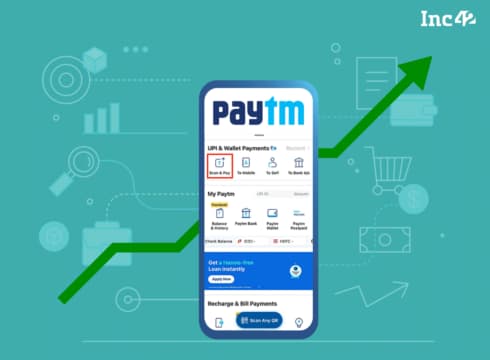Shares of Paytm jumped almost 6% to INR 729.35 during Monday’s (May 8) intraday trading session, ending the day at a seven-month high of INR 723.6 on the BSE
Paytm’s net loss declined 78% YoY to INR 167.5 Cr and operating revenue rose 51% YoY to INR 2,334.5 Cr in Q4
After falling 60% last year, shares of Paytm are currently up more than 36% YTD
Inc42 Daily Brief
Stay Ahead With Daily News & Analysis on India’s Tech & Startup Economy
Following its better-than-expected earnings for the fourth quarter (Q4) of the financial year 2023 (FY23), shares of Paytm jumped almost 6% to INR 729.35 during Monday’s (May 8) intraday trading session, ending the day at a seven-month high of INR 723.6 on the BSE.
Paytm reported operational profitability for the second straight quarter on Friday, with adjusted EBITDA, including full year Unified Payment Interface (UPI) incentive, of INR 234 Cr, which was well ahead of the Street’s estimates of around INR 110 Cr.
Paytm’s net loss declined 78% year-on-year (YoY) to INR 167.5 Cr and operating revenue rose 51% YoY to INR 2,334.5 Cr in Q4. The upbeat performance was driven by the startup’s strong growth in both payments and financial services.
Citigroup has increased its price target (PT) on Paytm to INR 1,144 from INR 1,103 while maintaining a ‘buy’ rating on the stock. The current PT implies an upside of 58% to the stock’s last close.
The brokerage sees significant headroom for Paytm to increase the penetration of its lending products into existing consumers. Besides, Citigroup believes that its growing digital payments business is another leg of the growth/profitability tailwind.
In Q4, Paytm’s revenue from payments services jumped 28% YoY to INR 1,334 Cr, which included a UPI incentive of INR 49 Cr. Paytm also disbursed 1.19 Cr loans worth INR 12,554 Cr during the quarter.
In fact, Macquarie believes that Paytm’s loan distribution business is the key driver behind its revenue growth and overall profitability. Maintaining an ‘outperform’ rating and a price target of INR 800, Macquarie said that it expects a 50% compound annual growth rate (CAGR) in loan distribution business revenues, assuming a constant take rate of 4% between FY23 and FY26.
However, the brokerage has cautioned that a few months of bad performance by the company could result in lenders withdrawing their credit lines, significantly affecting its ability to grow. There are also risks associated with increasing competition and regulatory changes, Macquarie said.
Meanwhile, reiterating its bullish stance on the fintech giant, Goldman Sachs said, “We believe these results should largely put to rest debates around Paytm’s business model traction and profitability, and we see resolution of outstanding regulatory issues (ban on PPBL and online merchant onboarding) as the next set of catalysts for the stock.”
The brokerage has maintained a ‘buy’ rating on the stock, with a price target of 1,150. Goldman Sachs expects Paytm to become the “most profitable company” within its India internet coverage from FY25, with EBITDA (excluding ESOP) of $191 Mn and $322 Mn in FY25 and FY26, respectively, as net income profitability also starts from FY25.
Meanwhile, domestic brokerage JM Financial, too, has maintained its ‘buy’ rating on Paytm and increased its price target to INR 855 from INR 750, implying an upside of over 18% to the stock’s close. It expects a normalised EBITDA breakeven for Paytm by FY25.
“While we have remained cautious on Paytm’s business model since our initiation given the high cash burn, risk on take rates in the financial services business and a long road to profitability, its operating metrics are gradually improving with management’s focus on increasing efficiencies and profitability, which in turn should aid Paytm to turn profitable by FY26, in our view,” analysts at JM Financial said.
However, with a price target of INR 750, Yes Securities has a ‘neutral’ rating on the stock. Greater profitability is set to be driven by operating leverage and not rising contribution margin, the brokerage said.
Paytm in its earnings report said that its Q4 FY2023 contribution profit of INR 1,283 Cr represents growth of 138% YoY and its contribution margin improved to 55% from 35% a year ago. However, excluding the UPI incentive, the contribution profit was INR 1,150 Cr, implying a 52% contribution margin in Q4.
Yes Securities noted that the contribution margin of 52% in Q4 compared to 51% in Q3, which does not contain the UPI incentive, implies flattish margin evolution.
After falling 60% last year, Paytm shares are currently up more than 36% YTD.
{{#name}}{{name}}{{/name}}{{^name}}-{{/name}}
{{#description}}{{description}}...{{/description}}{{^description}}-{{/description}}
Note: We at Inc42 take our ethics very seriously. More information about it can be found here.


